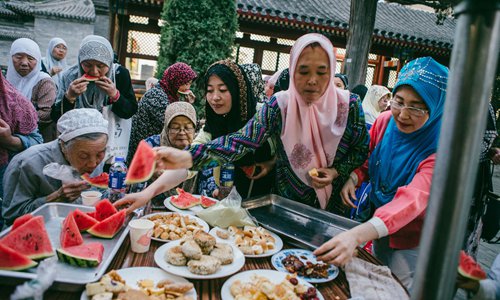
(Photo: Global Times)
Sitting in a spacious hall in a building on Beijing's Niujie Street, dozens of women wearing colorful embroidered headscarves earnestly pray as a loudspeaker above their heads broadcast the male imam who is leading the prayers in the nearby Niujie Mosque, the oldest mosque in the capital.
During Ramadan, which runs from May 17 to June 15 this year, hundreds of women, including foreigners living in Beijing, gather here to attend daily religious services.
As the Niujie Women's Mosque is under renovation, this hall has been chosen to serve as a temporary women-only mosque for Muslims in Beijing.
"China's women-only mosques are the best representative of religion with Chinese characteristics. It's a signature building that shows our respect for women," Liu Jun, director of the Niujie Mosque, told the Global Times in a previous interview.
Despite the fact that many Muslim women around the world face restrictions concerning entering mosques, Chinese women have a long tradition of praying at female-only mosques.
Liu said that the emergence of such mosques came about due to the intermixture of Chinese and Islamic traditions. He pointed out that Islam in China was influenced by the country's dominant culture which didn't prevent women from participating in public life.
Beijing built the first women-only mosque back in 1921 in Xicheng district, but the mosque was later demolished as it had become dilapidated with age. The local government rebuilt the new Niujie Women's Mosque in 2005.
There is no official figure regarding the total number of women-only mosques in China.
Shui Jingjun, a research fellow at the Henan Academy of Social Sciences, wrote in her book, The History of Women's Mosques In Chinese Islam, that such mosques first emerged in the central plains, which covers parts of the Anhui, Shandong, Hebei, Henan and Shanxi provinces.


